
How does it manifest itself and what is the treatment?
Everyone experiences feelings of anxiety at some point in their lives. Maybe you're feeling anxious about taking an exam or having a medical test, giving a presentation in front of a lot of people, or a job interview. At times like these, feeling anxious can be perfectly normal.
Anxiety becomes a problem when you find it difficult to control your worries, and the feeling of anxiety becomes a constant one that can affect your daily life. For people with anxiety disorders, anxiety is not a fleeting feeling, it doesn't go away easily, and it can even get worse over time.
What is anxiety?
Feelings of worry, fear, and stress that have cognitive, emotional, and physical effects are what we call anxiety. It can be to blame for negative thoughts and you can often feel like you have no control over your life or yourself. Anxiety can also cause somatic sensations such as sweating, trembling or shortness of breath.
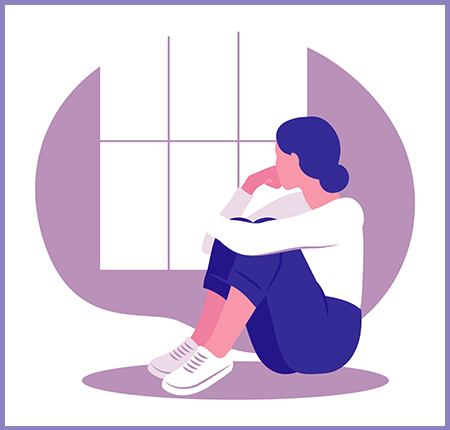
Anxiety is a basic emotion, necessary for survival, being associated with the automatic fight or flight reaction, which produces the necessary changes in the body to face an attack or imminent danger. When this emotion intensifies and occurs in situations or with people that pose no real danger (perhaps even becoming omnipresent), concentration, appetite, sleep, social relationships, and quality of life in general can suffer.
How anxiety manifests itself - Symptoms & signs
Those who experience anxiety can experience both psychological (mental) and physical symptoms. Among them, the most common are: 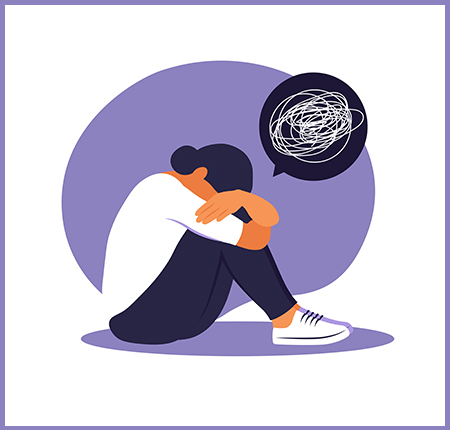
Feeling of restlessness
Agitation and nervousness, associated with generalized tension
The appearance of nervous tics
Sweats
Palpitations
Hyperventilation
Sick and shaking
Feeling of imminent death (occurs during panic attacks)
Fainting sensation
Sleep disturbances, nightmares
Digestive disorders, nausea, vomiting
Attention and concentration disorders, disorientation
Lack of energy, fatigue, migraines
Symptoms may begin during childhood or adolescence and continue into adulthood. In addition, it is possible for anxiety to appear in one's life following a traumatic episode.
Panic attack
People with panic disorder have frequent and unexpected panic attacks. Panic attacks are sudden moments or periods of intense fear, discomfort, or feeling out of control even when there is no clear danger or trigger. Not everyone who experiences a panic attack will develop panic disorder.
During a panic attack, a person may experience:
Increased heart rate
The feeling of shortness of breath or lack of air
Sweating
Trembling or tingling
Chest pains
The feeling of imminent death
The feeling that things are out of control
Dizziness, inconstant sensations, tendency to faint
The feeling of suffocation
Nausea or abdominal discomfort
Symptoms generally peak within 10 minutes and then subside a few minutes later. Although uncomfortable and sometimes even extremely distressing, panic attacks are not medically dangerous.
Types of anxiety
Anxiety is of several types, the classification being made according to causes and symptoms. A person can suffer from several anxiety disorders at the same time, and in this case the risk of developing depression or other personality disorders also increases.
As each person is different, each form of anxiety is different, and we are talking about the most common types of anxiety disorders now.
Generalized anxiety
Generalized anxiety involves the existence of anxious behavior over a period of time longer than six months, correlated with usual activities such as going out with friends, going to school/college/work and talking to strangers. It is characterized by constant restlessness, difficulty concentrating, negative thought patterns, frequent fatigue, nervousness and a general state of weakness.
This type of anxiety can be experienced by anyone and often occurs in conjunction with other anxiety disorders or depression.
Social anxiety
Also known as social phobia, this type of anxiety can be described as a strong fear of social situations in which the person may be evaluated or judged, therefore rejected or blamed.
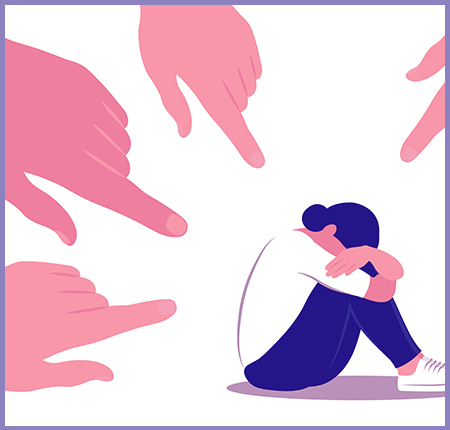
Those who experience social anxiety fear being perceived negatively by those around them, so they avoid any situation where they would have to have social interactions. If they fail to avoid them, strong physical symptoms such as excessive sweating, nausea and palpitations appear.
Separation anxiety
Separation anxiety is a childhood disorder characterized by excessive anxiety for the child's developmental level and related to separation from parents or other people who have parental roles. This type of anxiety can also occur in babies, couples, even pets.
Performance anxiety
People who experience performance anxiety may worry that they will fail before they even begin to solve a problem. and failure is often attributed to strong feelings of humiliation and rejection. Performance anxiety can occur in relation to any task and is common in the workplace.
PHOBIAS
A phobia is an intense fear or aversion to specific objects or situations. Although anxiety can be considered natural under certain circumstances, the fear that people with phobias feel is out of proportion to the actual danger caused by the situation or object.
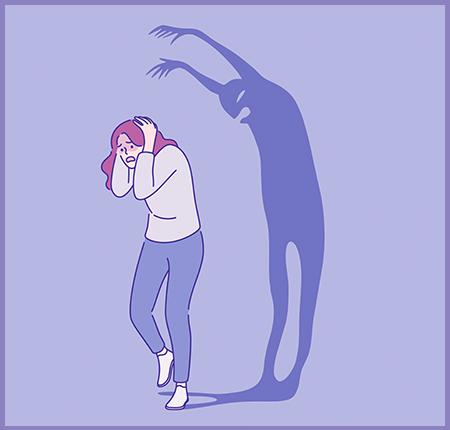
People with phobia:
May have irrational or excessive worry about encountering the feared object or situation;
They actively avoid the object or situation that causes them anxiety;
Experience the feeling of uneasiness and intense anxiety when meeting the object or situation they fear;
I feel immense anxiety when I have to endure unavoidable objects and situations.
Phobias manifest themselves in many ways and are caused by various factors, and the most common types of phobias are:
- Agrophobia (also called fear of open spaces), when the person fears and often avoids places or situations (large stores, elevator, in a room full of people) that can cause panic and make them feel trapped, helpless or embarrassed.
- Glossophobia or the fear of speaking in public, people affected by this phobia experience states of anxiety when they have to speak in public or just when they think about it.
More than 12% of the population has a phobia at some point in their lives, making it one of the most common mental disorders.
Panic / anxiety disorder
Panic disorder is a diagnosis given to people who have frequent panic attacks (episodes of intense and overwhelming fear, accompanied by chest pain, a feeling of suffocation and difficulty returning to a state of calm) or who feel severe anxiety anticipating the appearance of other panic attacks in the future.
Obsessive Compulsive Disorder (OCD)
This type of disorder is considered a chronic disease that evolves over time and is characterized by various obsessions and behavioral rituals that the person repeats to reduce anxiety. Obsessions are unwanted thoughts or worries that induce a state of heightened anxiety, and through compulsions (obsessive counting or washing of hands, repeating certain gestures or words) the affected person believes they can control the obsessions.
Post-traumatic stress disorder (PTSD)
It occurs as a result of traumatic events, accidents, the loss of a loved one or a strong shock, lasts for a long period of time and involves reliving the event through flashbacks and dreams. People suffering from this type of disorder also avoid the stimuli that triggered the trauma, isolate themselves, and may experience memory lapses in addition to excessive irritability, mania, or nervous outbursts.
Hypochondria
Hypochondria is the fear of having a serious illness, the fear being based on a misinterpretation of physical symptoms or normal body functions. People suffering from hypochondria are always afraid that something is happening to them, that they are suffering from serious diseases, that doctors are not paying enough attention to them, that they have not been properly checked and that information about their health condition is being withheld from them.
Fear, anxiety & depression - What is the difference and connection?
Faced with a real and immediate threat, the normal cognitive and emotional response for any person is fear. When we hear a sudden and loud sound, when we pass by a strange house in the yard of which a dog is aggressively barking, the brain receives the signal "attention, danger!" and in an extremely short time it transmits various messages in the body designed to ensure our survival. Fear lasts for a short period of time, is focused on the present moment, and is oriented toward a concrete threat.
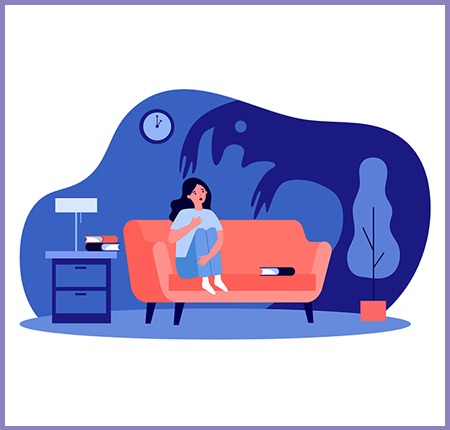
On the other hand, anxiety is the body's natural response to stress and is a feeling of fear or apprehension about future events that may happen in one's life. In addition, anxiety is felt for a longer period of time, it is perceived confusingly and makes us overly cautious. Thus, the body remains in a continuous and exhausting state of alertness.
As for depression, it is a mood disorder that causes a persistent feeling of sadness and loss of interest in activities that were once enjoyable. Also called major depressive disorder, it affects the way we feel, think and behave and can lead to a variety of both emotional and physical problems.
Often times, people who experience long periods of anxiety also suffer from some form of depression, but this is not always the case.
Causes - Anxiety
The causes of anxiety disorders are not fully known. Anxiety can occur at any age and is often caused by a combination of factors. Among the most common causes are:
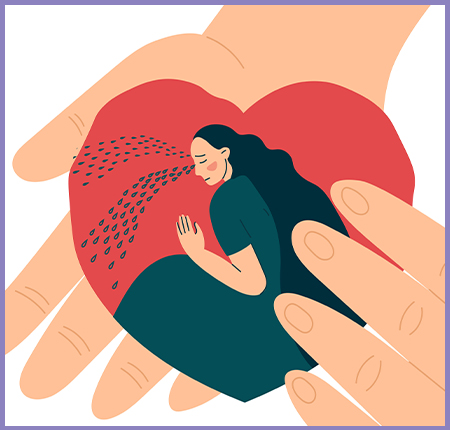
Genetic predisposition
Imbalances in brain chemistry
Family history
Social influence
Life experiences (major changes, trauma)
Depression (including postnatal depression)
Major diseases
A stressful work environment, a traumatic event, loneliness, possible childhood abuse, parental divorce, living with an alcoholic parent can all contribute to the development of an anxiety disorder.
Even an extremely caring family, where fearful behavior prevails, can teach the child to see the world as a dangerous place full of threats. In addition, a link has also been found between alcohol dependence, psychotropic compounds (medications or drugs) and anxiety disorders.
Anxiety in pregnancy
Feeling anxious during pregnancy is not at all unusual and abnormal. There are several risk factors that influence its appearance, such as: hormonal and physical changes that occur in the mother's body, an anxious-depressive syndrome before pregnancy or various other psychiatric pathologies pre-existing during pregnancy, stress, alcohol or drug consumption. Added to all this are the worries that a future mother has about her pregnancy, so it is important to take care of our mind, body and soul especially when we are pregnant.
Premenstrual & postmenstrual syndrome and anxiety
The pre- and postmenstrual period is particularly prone to high hormonal fluctuations and can lead to a strong feeling of anxiety during menstruation. This type of anxiety is one of the recognized symptoms of premenstrual syndrome (PMS) which we told you all about in one of our blog articles.
Anxiety in children & adolescents
The most common anxiety disorders in children and adolescents are separation anxiety, specific phobias, panic disorders, generalized anxiety disorder or post-traumatic stress disorder. Anxiety can appear as early as a few months of life, and the child manifests itself in many ways. For example, a baby will start to cry if he is held by a stranger, a child may be afraid of clowns or complain of a stomach ache on the first day of school (expressing his anxiety physically), so also the causes can be various.
To prevent these disorders, the parent must closely monitor how the child feels, what events are happening in his life, if any physical manifestations or imbalances occur. If significant changes are observed, it is always a good idea as a parent to seek the help of a doctor to determine how you can help your child.
Anxiety test - How is a diagnosis made?
There are several anxiety tests on the Internet consisting of a series of questions about sensations, behavior and the level of anxiety we feel in certain situations. It's good to remember that these tests are not a reliable diagnosis.
There is no actual test to determine whether or not a person suffers from this disorder, so when it becomes impossible to relax because of the symptoms or when they interfere with everyday life, it is necessary to go to the doctor for to check that they are not caused by certain medical conditions (asthma causes difficulty breathing, for example). If no specific cause is found, the doctor will make a diagnosis of anxiety disorder.
Anxiety treatment
Anxiety disorder is a condition that can only be diagnosed by a psychiatrist or a psychotherapist. It is also essential to assess the degree of severity of anxiety states in order to establish an effective therapeutic plan.
Depending on each person's needs, treatment may include psychotherapy, medication, or both.
Psychotherapy for anxiety
The most effective type of psychotherapy is cognitive-behavioral. Through a relatively short number of sessions held by a psychotherapist, the fears of the person suffering from anxiety are identified and methods are found to alleviate the symptoms felt, but also solutions to avoid anxious states in the future.
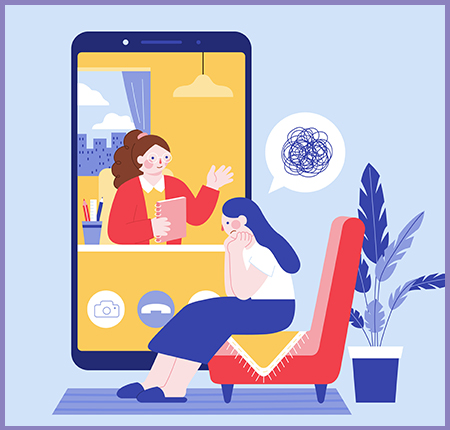
This type of therapy also includes exposure therapy, in which the person gradually comes into contact with the object or situation that triggers the anxiety so that they gain confidence that they can manage the situation and the anxiety symptoms.
Anxiety relaxation techniques
Even though there is no definitive way to get rid of this emotional disorder, anxiety can be controlled and relaxed through some concrete, simple methods. So, remember that it helps you to:
You trick your mind into thinking about something else.
Find out what's bothering you.
You focus on what you can change.
Choose a balanced diet.
Get enough sleep.
Healthy & relaxing habits
For many people, anxiety can become pervasive, and that forces us to learn how to live with it. You can therefore choose to create a routine that gives you the peace you need or that simply relaxes you. Here are some custom ideas from us:
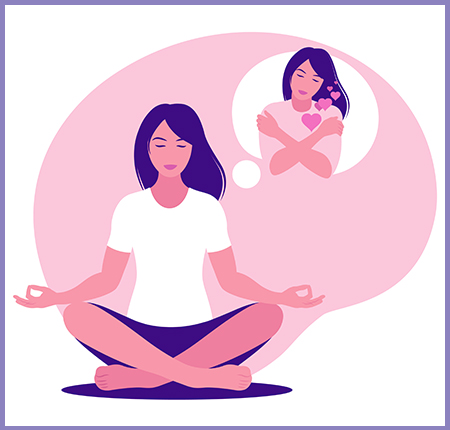
Immerse yourself in a creative activity (such as drawing, painting, writing) at least once a day.
Find a hobby to devote yourself to.
Go for a walk or a run to use up the physical tension built up in your body.
Listen to music.
Meditate or try simple yoga poses.
Read a book or watch a good movie.
Whatever you choose to do, pay attention to how an activity makes you feel, listen to your feelings and embrace them to live in harmony with them.
Natural treatment for anxiety
Aromatherapy is one of the most effective home remedies for anxiety. For aromatherapy sessions, it is recommended to use lavender, jasmine or sandalwood oil.
If you feel that stress is overwhelming you and taking over your body, it is a good idea to make yourself a cup of herbal tea and take a break to enjoy it. Some of the best herbs for anxiety include: chamomile, gingko biloba, valerian root, lavender, St. John's wort, green tea, hawthorn. They calm the nervous system and contribute to a much more restful sleep.
Drug treatment
If the degree of severity of anxiety states is high and psychotherapy is not enough to relieve the symptoms, the doctor may recommend drug treatment. Several types of medication are used to help relieve symptoms, depending on the type of anxiety disorder you have and whether you have other mental or physical health problems. Drug treatment may include antidepressants, anxiolytics, sedatives or beta-blockers.
Complications Anxiety
If anxiety is not treated, the anxiety disorder can worsen, leading to mental and physical conditions such as:
- Depression or other mental health disorders
- Substance abuse
- Sleep problems (insomnia, nightmares)
- Digestive or intestinal problems
- Headaches and sore throats
- Social isolation
- Problems functioning at school or at work
- Low quality of life
Anxiety Prevention - Tips & Recommendations
Although there is no way to predict with certainty what will trigger the onset of an anxiety disorder, we can take steps to reduce the impact of symptoms, but also to find balance during or after the anxiety period. Basically, it's important to understand that changes in our lifestyle can make a big difference.
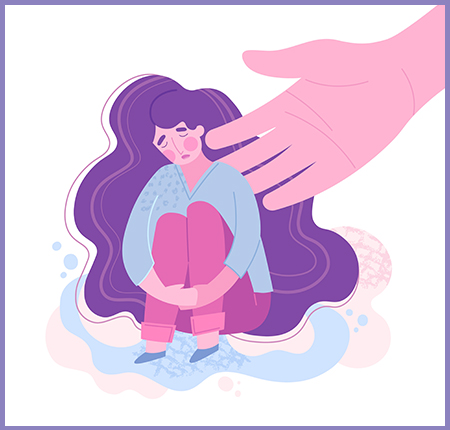
So what can you do to take better care of yourself and your body?
Get help early if you suffer from anxiety, it can be harder to treat if you intervene later.
Find your hobbies and do activities that bring you joy.
Invest time and social interaction, relationships with others can help reduce fears and anxieties.
Avoid consuming alcohol or drugs as they can worsen your anxiety.
Quit smoking and drinking caffeinated beverages, both of which increase anxiety.
Use stress management and relaxation techniques such as breathing exercises, muscle relaxation or visualization techniques.
Make sure you get enough rest every night.
Eat balanced and pay attention to your diet because it ensures your long-term health.
Frequently asked questions
If the article didn't answer all the questions you had, here are some more frequently asked questions.
How does alcohol affect anxiety?
Alcohol significantly affects the chemistry of the human brain by altering what we call balance. Alcohol consumption can also worsen anxiety and depression, trigger panic and restlessness, and change a person's mood or behavior. Especially when following a drug treatment, it is recommended to avoid alcohol.
Can anxiety symptoms get worse during menstruation?
The pre- and post-menstrual period is prone to high hormonal fluctuations and can lead to a strong feeling of anxiety during menstruation. Although it is not a rule, there is a possibility that during menstruation we feel anxiety more intensely.
Can anxiety be controlled?
There is no evidence yet that anxiety can be cured, but we know for sure that it can be managed and controlled through every decision we make. As I was talking about earlier, the treatment can mean for someone, simply, a healthier and more relaxing lifestyle, or drug treatment may be needed.






















